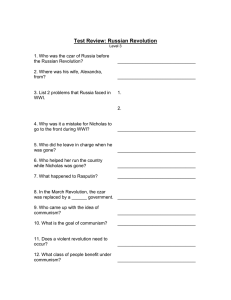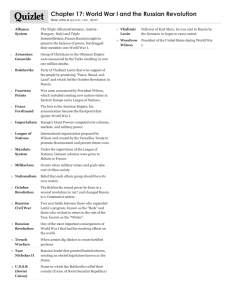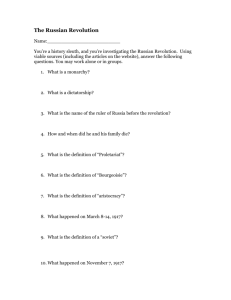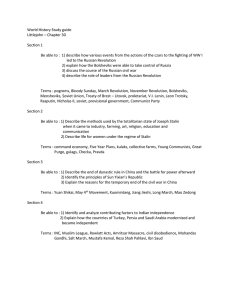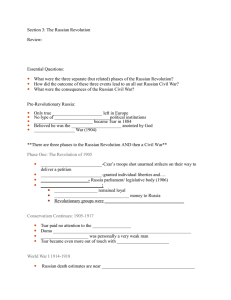Russian Revolution and formation of Communism
advertisement
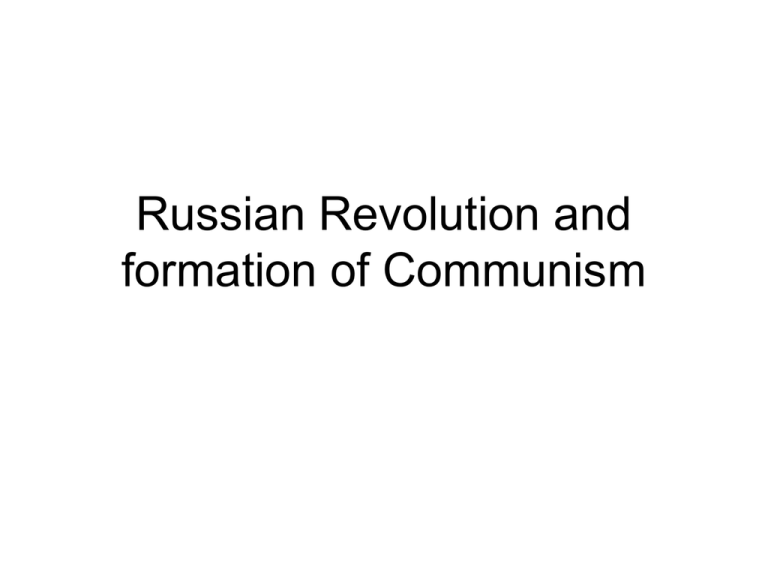
Russian Revolution and formation of Communism Agenda 1. Bell Ringer: Quick Review with Mr. T. (10) 2. Lecture: Finish Russian Revolution (20) 3. The Picture Issue…. Oh Stalin.. (6) 4. Russian Revolution video (10) 5. Cause and Effect Activity (15) 6. War, Peace and Bread Illustration (10) 7. Leaders and their mistakes.. (10) 8. Quick Questions Russian Revolution HW: Quiz Next Class on Russian Revolution, Make sure you submit your thesis to Mr. T. Obj: - Students will create a poster emphasizing the goals of the Bolshevik Party during the Russian Revolution. - Students will analyze the outcomes of mistakes carried out by political leaders in World War I. Quick Review of World War I • • • • • • • • What was the major cause of World War I? How did the United States get involved? When did the war end? Identify new technologies that were utilized during the war. What happened to Germany because of the Treaty of Versailles? How were Wilson’s Fourteen Points utilized within the Treaty? What are the weaknesses of the League of Nations? Why would Russia leave the war? So Far… • February/March Revolution gets rid of Tsar Nicholas II and his family. • Provincial Government is running the country, World War I is raging. • Vladimir Lenin thinks a more violent Revolution is needed. Vladimir Lenin • Became a revolutionary after brother was killed. – He was attempting to assassinate the Tsar. • His own plot would lead to Lenin fleeing from Russia in the early 1900s. • Becomes “Father of the Revolution” The Bolshevik Revolution • The provisional government falls. • “Peace, land and bread” • Lenin’s rallying cry resonated with the people. • Over in a few hours with the storming of the Winter Palace, culminating in the arrest of the former government leaders. Lenin in power • All farmland is distributed among peasants. • Control of factories given to the workers. • Signed a truce with Germany. • Brest-Litovsk treaty signed, giving Russian territory to Germany (Poland). Civil War in Russia • White Army goes against Bolsheviks and Leon Trotsky. • 1918-1920- 15 million killed over three years. – Famine and disease caused a lot of these deaths. • Red army eventually succeeds. New Philosophy, New Russia • New Economic Policy – Small scale capitalism, peasants can sell their crops instead of giving to the government. – Encouraged foreign investment. – Major industry controlled by the government. • Eventually they would move towards Communism, complete government control. Political Reforms • Russia was made into several self governing republics. • Bolsheviks are renamed “Communists”, constitution is based on socialist and democratic principles. • Economic recovery follows through 1928. • Lenin dies in 1924. Lenin vs. Stalin • Lenin advocated pure Communism, handing over control of farms and factories to the “people” but all goods were sent to the government for redistribution. • Stalin would take power soon after the death of Lenin. He would force Trotsky into exile, and change Communism to a totalitarian policy. The picture issue • If Stalin didn’t like you, you were banished from the country. • And any connections between you and Stalin are cut. • He cut you out of his life, and his pictures, and the history of Russia. Now you see him Now you don’t Now you see them Now you Don’t Russian Revolution Review • What are the causes of the Russian Revolution? • When was Tsar Nicolas removed from the throne? What happens to him and his family? • Who takes power in Russia right after the Tsar? • How does the Provisional Government deal with World War I and Domestic Issues? • What are the differences between the Mensheviks and the Bolsheviks? • When does Lenin take over? • Why is Stalin seen as a threat? • What governmental philosophy is adopted in Russia after the Revolution? Widespread discontent among all classes of Russian society. Czar and his family killed— End of Absolutist Rule Agitation from revolutionaries Civil War (1918-1920) Losses in World War I Peace with Germany under Treaty of Brest-Litovsk Defeat in Russo-Japanese War Russian economy in ruins Weak leadership of Czar Nicholas II Bolshevik control of government Bloody Sunday Strikes and Riots
